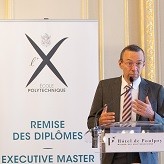Building on its success, the Executive Master is preparing the next steps in its development


Nicolas Mottis and Cécile Chamaret during the graduation ceremony of the 3rd class of the Executive Master
At the origins of the Executive Master, which he has directed since its launch, Nicolas Mottis, professor in the Management of Innovation and Entrepreneurship Department, wanted to entrust Cécile Chamaret with the task of leading the next steps in the development of the program. A lecturer in the Department since 2017, Cécile Chamaret has already participated in the success of the Executive Master as a faculty member and tutor of Team Pojects.
Cécile Chamaret will officially take over the direction of the program on September 1st and will be in charge of the 5th class from the start. Nicolas Mottis will accompany the 4th class until its graduation and will continue to be involved in teching as well as moderating Team Projects.
The graduation ceremony for the 3rd class of the Executive Master took place on June 28th at the Maison des Polytechniciens. How is the program positioned in the executive education market ?
Nicolas Mottis: The Executive Master remains a rather unique program, which combines science, technology and management. It is aimed at executives and managers aged 43 on average and a wide variety of profiles in terms of sectors, countries, company size, initial education, etc. It is very different from traditional Executive MBAs, including its management component, which in the case of the Executive Master is very focused on management. It is very different from traditional Executive MBAs, including its management component, which in the case of the Executive Master is very focused on innovation management and personal development. Finally, it is modular in format, over 14 months, with some modules completed in some of the best universities in the world (Berkeley, TUM, etc.).
Cécile Chamaret: The originality of the training lies in the "state of the art" components of the program which allow executives and managers to update their knowledge in cutting edge and constantly evolving scientific fields. The training also allows participants to develop innovative entrepreneurial projects with a strong technological dimension.

The graduates of the 3rd class of the Executive Master
What were the key success factors of the program?
Cécile Chamaret: One of the strengths of the program is that it is constantly evolving to allow the acquisition of the most recent scientific knowledge. The modules evolve each year to offer the most advanced training possible in contact with the School's researchers. The size of the class (36) and the diversity of profiles also allow for rich and qualitative exchanges between participants.
Nicolas Mottis: The quality of the education, which is essentially based on senior researchers at the cutting edge of their field, and the entrepreneurial spirit developed throughout the program, which is reflected in the numerous business start-ups launched by our students.
How does the Executive Master fit in with the training programs offered by the École Polytechnique and the Institut Polytechnique de Paris?
Nicolas Mottis: This is the X degree in executive education. It welcomes high-level participants and capitalizes on the best of the Polytechnic tradition (generalist curriculum, high level of abstraction and requirements, ability to deliver, great emphasis on humanities, social sciences and management, etc.).
Cécile Chamaret: The Executive Master completes the training offer of the Ecole Polytechnique by offering a long, demanding and degree-granting high-level training.
What are the next major steps in the development of the program and in particular the schedule for the opening of a second annual class?
Cécile Chamaret: We want to strengthen the internationalization of the program with the upcoming opening of a second class whose courses will be exclusively in English and aimed at foreigners living in France. Internationalization will also include the development of new partnerships with some of the best international higher education institutions.
 Support l'X
Support l'X